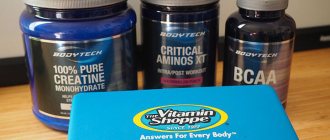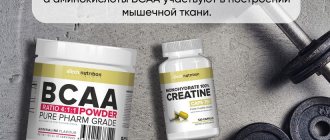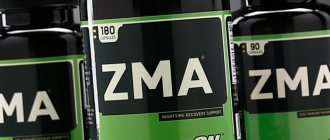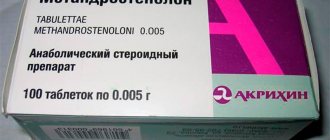Home » Recovery » Amino acids » BCAA » Can protein and BCAA be taken together?
BCAAAProtein
What are the rules for taking BCAA and protein? Can these two supplements be taken at the same time or is it better to take them separately? Or maybe you should give preference to one of them? Athletes involved in bodybuilding are very often interested in these issues. At first it may seem that mixing these two additives makes no sense, but it is worth looking into this in more detail.
Sports nutrition: how to choose and where to start
Before going to a sports nutrition store, you should determine your training goal, analyze your diet and daily routine.
And based on this, choose the right sports nutrition. So, for example, if you are overweight and your goal is not only to build muscle mass, but also to lose weight, then preference should be given to whey protein rather than a gainer. But let's talk about everything in order. The first thing that beginners should remember is that sports nutrition is food, not magic pills and powders. Of course, they can improve your results, but they cannot work a miracle and turn you into a real bodybuilder in a month. Therefore, you should not buy the entire assortment of a sports nutrition store and drink it in huge quantities. It's best to focus on the essential supplements that are essential for muscle growth and wellness.
We recommend starting your acquaintance with sports nutrition with protein and/or gainer, as well as vital and often missing amino acids. About which sports nutrition to choose if your goal is to lose weight, read our other article - Sports nutrition for weight loss, and if you want to gain weight, then recommendations for sports nutrition taking into account this goal can be found in the article - Top 5 best supplements for weight gain . Here we will talk about how to properly take and combine different sports supplements.
The best proteins
Blackstone Labs Isolation
Price: 3968.00 rub.
Card Product
Condemned Labz Commissary Whey Protein
Price: 3584.00 rub.
Card Product
Go to the Protein category »
How to properly combine and take different sports supplements
If your diet contains several types of sports nutrition, then you must follow the intake regimen. This is due to the fact that some supplements work better when taken together, while some, on the contrary, interfere with each other’s absorption.
How to drink sports nutrition correctly:
- You can drink protein at any time of the day, both on training days and on rest days. It is not recommended to take a protein shake immediately before training, because working out with a full stomach can be dangerous to your health. But if this happens, it is advisable to drink a cocktail at least an hour before training. But it’s better in 1.5 or 2 hours. The classic intake regimen for protein: from 1 to 3 times a day, depending on the amount of protein that you want to compensate for with protein. Taken between meals and preferably within 4 hours after training, for maximum stimulation of protein-synthetic processes.
- Casein protein is a slow-release protein. You can drink it in the morning or during the day between meals, as well as just before bed.
- Gainer is best drunk immediately after training to quickly replenish the loss of macronutrients important for the body during the training process. They can also replace one of your meals. Classic dosage regimen: 1-2 times a day between meals and after training.
- Creatine should be taken with protein mixtures. Classic dosage regimen: Also between meals, from 5 to 20 grams per day. If you are preparing for a competition or a period of high-intensity training, then take creatine in equal portions 4 times a day, 5 grams each. If there is a period between competitions or a period of less intense training, then 5 grams per day once will be enough.
- Amino acids can be consumed throughout the day, regardless of meals or other supplements. But it is considered optimal to take it before, during and after training.
- Glutamine is a fairly unstable supplement, so you need to drink it immediately after mixing it with water. The optimal time to take it is before bedtime.
- In almost all dosage regimens, carnitine is drunk half an hour before training. But some experts recommend taking carnitine after a workout, arguing that it does not accumulate in the muscle fiber, and this way you reduce oxidative stress in the muscle fiber, allowing for faster recovery.
Which is better protein or amino acids (+BCAA)? Feedback from the head physician
We decided which is better for amino acids (including bcaa) or protein to the head doctor of one of the clinics. Pay attention to the logic of reasoning.
— Is there any point in taking amino acids in the form of special supplements? Maybe with a complete protein diet, all of them are already included in the food in optimal quantities?
Taking amino acids is not natural for a healthy body. Nature provides for the entry of protein into the digestive tract, its preparation and subsequent breakdown by enzymes into peptides and amino acids.
Feedback from the chief physician: “.. taking amino acids is not natural for a healthy body”
There are a small number of situations in medicine where the function of the gastrointestinal tract is so damaged that protein breakdown is an impossible task. This happens, for example, when enzymes, which are also proteins, are not synthesized in sufficient quantities due to surgery or as a result of other massive damage, or in premature babies, as a result of the immaturity of the digestive system.
Indeed, the entry into the bloodstream and delivery of amino acids to the site of synthesis of one’s own proteins (from which muscles are built) occurs faster when taking amino acids. But. If your digestive tract is able to receive and break down protein, then the harmonious intake is protein, and not amino acids (this applies to all their types, including bcaa).
We recommend : How much protein should you drink per day to gain muscle mass?
Indeed, some amino acids are more important for muscle growth than others. This, however, does not mean that “less important” amino acids are not needed and it is better to exclude them from the diet as unnecessary ballast.
There are essential amino acids (the name only implies the impossibility of their synthesis in our body), there are replaceable ones, the synthesis of which is possible. But, in any case, for both of them it is meant to be taken orally as part of balanced diet.
Thus, from the point of view of the expediency of maintaining balanced processes and harmonious development (after all, it is better to obey nature, since it will not be possible to deceive anyway), the presence of all amino acids in the daily diet is important to maintain natural metabolic processes.
Share with us your experience of losing weight or gaining muscle mass!
The availability of individual amino acids as dietary supplements... I don't want to be stubborn and admit that I have no long-term experience outside of medicine, but I still can't find enough justification for using them .
Feedback from the chief physician: “.. I don’t see sufficient justification for the use of individual amino acids (including bcaa) in the form of supplements”
— In what cases and to whom can it be recommended to take amino acids in the form of supplements?
Don't know. A balanced protein is better.
Since the body is more complex than a bread oven (add ingredients, mix, put in the oven, you get the required mass of the product), for an adequate weight gain process, conceived by nature, worked out in the process of phylogenesis, you need not just bring amino acids to the place of use, you need them correctly , i.e. isolate enzymes in the gastrointestinal tract, break them down into polypeptides and monopeptides, and then into amino acids; at the same time, special hormones are released that promote muscle growth (anabolism) and send building material to where it is needed.
These mechanisms are not able to replace both amino acids and hormones coming from outside , since the mechanisms are much more complex than what anyone can come up with... athlete.
Feedback from the chief physician: “.. it is important not just to deliver amino acids, but to obtain them correctly (break them down), during which muscle growth hormones are released”
— Often the recommended dose of protein is 2-3 grams. Isn't it overpriced? Such quantities are recommended by many “pros” and stores. In the Encyclopedia of Sports Medicine. Sports nutrition”, for example, in the section on proteins, there are graphs showing that at a dosage of ~2.2 g per kilogram of body weight, there is no effect from taking protein, and the optimal dose is 1.7 g/kg.
Agree. Rather overpriced. According to all sources known to me, this should be at a level of around 2 g/kg .
From medical practice, the general dosage of amino nitrogen for patients (necessary to ensure basal metabolism and repair processes) is 0.15-2 g/kg per day, in reality, after reaching normal tolerance, 0.5-1.5 g/kg.
I assume that for muscle growth you need 2.0-2.5 g/kg, you need to read it before you have time. I brought this calculation (believe me) before I consciously read what was in your last question.
This nitrogen, to simplify things a little, can consist of a 50/50 mixture of essential and essential amino acids.
We recommend : How to properly take protein for muscle growth?
How to Take Protein and Creatine Together
As you know, creatine requires a transport system that helps it be absorbed in the body. Protein is just such a system, so they should be taken together. However, creatine intake does not have to be tied to a specific training time. You can drink it along with protein between meals, as well as before or after training, as you prefer - 20 grams per day in equal portions (that is, 3-4 times) during high-intensity exercise and 5 grams per day once during low-intensity exercise.
Creatine can be taken at the same time as protein or other sports supplements.
What is still better to drink?
The choice between BCAA or protein is usually driven primarily by economic benefits. Protein sports nutrition contains a complete amino acid profile, and purchasing it is much more profitable. Calculations show the following: 1 gram of purified powder usually contains from 185 to 250 milligrams of BCAA (that is, up to twenty-five percent).
To get 1 gram of BCAA you will need to drink about 5.5 grams of the supplement. The average price for 1 g is three rubles. The price range is determined by the brand and quality of the company. Thus, the complex costs three times more than whey protein. Whether it makes sense to purchase expensive sports nutrition, everyone decides for themselves. Success directly depends on a properly designed diet plan and the athlete’s systematic approach to strength training.
So, in this article we looked at what is better - protein or BCAA.
How and why to take protein and gainer together
Many beginners wonder whether it is possible to take protein and gainer together and how to combine them. Before answering the question, you should understand how these supplements differ.
Protein shakes consist primarily of protein and a small portion of carbohydrates. By drinking such a supplement, an athlete can quickly compensate for the lack of amino acids in the muscles and speed up their regeneration. Drinking protein drinks helps increase muscle mass and get rid of excess fat.
Gainer is a complex supplement. It contains proteins, fats, slow or fast carbohydrates (depending on the gainer) and has a fairly high calorie content. Experienced athletes note that taking these two sports supplements together gives good results in the process of building muscle mass. This is especially true for people with a thin body type - ectomorphs, who find it difficult to gain weight and provide the necessary calorie surplus from their regular diet. People who are prone to obesity should limit the amount of it in their diet - due to the high calorie content, it is easy to gain extra pounds with a gainer.
For simultaneous intake of protein and gainer, there is a classic scheme:
- gainer - in the morning and after training;
- protein in between meals and before training (1-2 hours before).
Effect on muscles
Every athlete is well aware of the positive properties of BCAA amino acids and protein. But not everyone knows what exactly the features and differences of these substances are. It is worth noting this very important point: the last element also consists of BCAA, which are directly involved in the synthesis of muscle proteins and reduce muscle destruction after each grueling workout. This is the subject of many discussions about whether it is necessary to consume a lot of protein at all or whether only BCAA will be enough.
It is important to find out in advance how to drink protein and BCAA.
An important function of this element is that it provides a positive nitrogen balance, which creates conditions for the process of anabolism, which is very important for muscle recovery and growth after prolonged and intense training. Therefore, protein must be present in the diet. High-quality protein comes from animal and plant products, primarily isolates and soy.
Should you drink protein and amino acids together and how to do it?
Novice athletes mistakenly believe that amino acid complexes and protein shakes are interchangeable supplements, so there is no point in taking both at the same time. However, these supplements have different effects on the body, and if you want to achieve the desired results, then they can and should be taken together.
Protein is a building material for the body, increases nitrogen balance, which leads to improved metabolism.
Amino acids are needed by the body for rapid regeneration. They are absorbed and enter the bloodstream much faster than protein, giving a surge of energy and strength. With the help of BCAA and other complexes, you can quickly restore damaged muscles, increase the body's endurance and strengthen the immune system in general.
Classic regimen:
- protein - you can drink it at any time of the day - in the morning, between meals, after training, before bed;
- amino acids - bcaa, glutamine and arginine - before, during and after training.
If your goal is not only to build muscle, but also to get rid of excess fat, then it is recommended to combine protein and carnitine intake. In this case, protein should be taken as usual, and carnitine only before training.
Reviews of doctors and experts from the Examine.com portal about BCAA amino acids
Examine.com is a well-known English-language portal that studies what science says about the benefits and harms of certain sports (and not only) supplements, ingredients, and medications. Here's what its creators (doctors and scientists) think about the benefits of BCAA 3:
“I only use BCAAs when I’m cutting my body (calorie restriction), usually before a workout.” — Sol Orwell is a fitness and nutrition-obsessed entrepreneur who co-founded Examine.com. (During “drying the body,” the calorie intake of the diet is severely limited, and to avoid muscle catabolism, it is important to consume enough protein.)
If you think what we do is important, support our project!
YES!
We recommend : Rules for drying the body in bodybuilding
“When it comes to suppressing fatigue, BCAAs are most likely only effective for untrained (beginner) athletes during prolonged training.
It is clear that there is a difference in the effect of BCAA on trained and untrained athletes, which may be explained by the lower endurance for physical exercise in those who lead a sedentary lifestyle (they show signs of fatigue earlier and the effect of eliminating these signs is more pronounced.” - Kurtis Frank - Lead Researcher for Examine.com, PhD in Applied Dietetics from the University of Guelph.
Examine.com Physician-Researcher Review: “..BCAAs are most likely only effective for untrained (beginner) athletes during prolonged training.”
How to combine different amino acids and take them together
So, we have already figured out how to combine the intake of amino acids with other sports supplements. Let's now figure out whether it is possible to mix different amino acids and how to do it correctly.
Many amino acids can be taken together. This is why there are so many different amino acid complexes on the sports nutrition market. But advanced athletes prefer to combine different amino acids on their own, because it’s easier to control the dosage.
One of the most popular combinations is bcaa and carnitine. This complex is indispensable for those who want to lose weight without losing muscle mass. The combination of carnitine and agrinine has the same effect. Taking these amino acids helps to achieve a significant reduction in the percentage of subcutaneous fat. It is recommended to drink both complexes before training.
Where to buy BCAAs and protein that combine with each other
I can recommend a protein that is rightfully considered the best on the market. This is Optimum Nutrition, Gold Standard, 100% whey protein . Weight 2.27 kg. Price 4,142 rubles.
BCAA - best buy California Gold Nutrition, AjiPure Branched Chain Amino Acids .
I’ve been drinking this combination myself for many years. Excellent taste, shape, I feel an excellent effect.
Is it possible to drink creatine, protein and bcaa together?
Protein, bcaa and creatine are essential supplements in the diet of a real athlete. With their help, you can achieve amazing results, if you do not forget about regular training. We offer you one of the most effective, in our opinion, regimens:
- Btsaa – in the morning, before and after training (can be mixed with creatine in one shaker);
- Protein – between meals, after training (with a serving of bcaa);
- Creatine – before and after training (with bcaa).
Recommendations for the proper use of sports nutrition from an expert trainer
To get the desired result from taking sports nutrition, you should follow some rules:
- Mixing sports supplements in advance. Often, when getting ready for a workout, some people pre-mix cocktails at home, go to the workout with them, and then drink them. By then 2-3 hours have passed. During this time, the molecular bonds of some substances in water disintegrate. For example, when mixed with water, creatine begins to break down after 40 minutes, and BCAA after 10 minutes. Therefore, prepare your sports drinks immediately before drinking.
- Timing of supplement use. The timing of taking supplements is of great importance; some are best taken on an empty stomach, others with or after food. This is especially true for vitamin preparations and dietary supplements. For example, fat-soluble vitamins A, D, E, K, F must be taken together with foods containing fats for better absorption. Glucosamine and chondroitin can cause intestinal irritation if taken on an empty stomach, so it is best to drink them after meals.
- Replacing regular food with supplements. It is not recommended to replace full meals with supplements, because supplements are just an addition to the main diet. They only help fill nutritional gaps throughout the day. By replacing a protein meal with whey protein or casein, we will not get the additional nutrients found in the foods.
- The bigger, the better. A common mistake made by beginners is to buy up all the most beautiful cans of sports nutrition and start consuming huge quantities of everything. Overdoses of dietary supplements can cause health problems. These can be various allergies, disruption of the gastrointestinal tract or central nervous system, organs of the body’s excretory system, etc. For each supplement there are certain dosages, the manufacturer always indicates them on the packaging, be careful!
- Stop taking supplements due to lack of immediate effect. It is not always possible to immediately feel the effects of sports nutrition. A quick effect is felt only from various stimulants (pre-workouts, caffeine, etc.) or muscle relaxants. A gradual effect in the form of a good pump and blood supply to the muscles can be seen from taking nitrogen supplements (citrulline or arginine). Other substances, such as glucosamine, have a cumulative effect and are felt after a long period of use. The work of recovery drugs can also only be assessed after time. I advise you to train for a couple of months using such supplements, and then stop taking them for a couple of weeks and compare your feelings. This way you can feel how well they helped you recover.
Using the promotional code BLOG in the official online store
primekraft.ru there is a 10% discount on the entire range! Delivery throughout Russia.
Sources[edit | edit code]
- BJSM reviews: AZ of nutritional supplements: dietary supplements, sports nutrition foods and ergogenic aids for health and performance Part 4. Burke LM et al. Br J Sports Med. 2009 Dec;43(14):1088-90. doi: 10.1136/bjsm.2009.068643. www.ncbi.nlm.nih.gov/pubmed/19955167
- https://ajpendo.physiology.org/content/283/4/E648.full
- Churchward-Venne TA et al. Supplementation of a suboptimal protein dose with leucine or essential amino acids: effects on myofibrillar protein synthesis at rest and following resistance exercise in men. J Physiol. 2012 Jun 1;590(11):2751-65. doi: 10.1113/jphysiol.2012.228833. Epub 2012 Mar 25. https://www.ncbi.nlm.nih.gov/pubmed/22451437
- Balage M, Dardevet D. Long-term effects of leucine supplementation on body composition. Curr Opin Clin Nutr Metab Care. 2010 May;13(3):265-70. doi: 10.1097/MCO.0b013e328336f6b8.
- https://www.ncbi.nlm.nih.gov/pubmed/15930475
- Dieter BP, Schoenfeld BJ, Aragon AA. The data do not seem to support a benefit to BCAA supplementation during periods of caloric restriction. J Int Soc Sports Nutr. 2016 May 11;13:21. doi: 10.1186/s12970-016-0128-9. eCollection 2016.
- https://www.ncbi.nlm.nih.gov/pmc/articles/PMC4865017/
- Biotechnology of Food and Feed Additives
- https://www.kagedmuscle.com/blogs/science/113500163-know-your-bcaa-4-differences-you-didnt-know
- Sandeaux J. et al. Extraction of amino acids from protein hydrolysates by electrodialysis // Journal of Chemical Technology and Biotechnology. – 1998. – T. 71. – No. 3. – pp. 267-273.
- https://www.sciencedirect.com/science/article/pii/S1004954108601056
- https://www.vrg.org/blog/2011/03/16/leucine-isoleucine-and-valine-may-be-derived-from-duck-feathers-or-human-hair-vegetable-based-versions- available/
- https://truenutrition.com/blog/bcaa-dark-side/
- https://www.vrg.org/blog/2011/03/16/leucine-isoleucine-and-valine-may-be-derived-from-duck-feathers-or-human-hair-vegetable-based-versions- available/
- https://blog.nutrabio.com/2015/08/18/the-truth-about-animal-vs-plant-based-bcaas/
- Martinez-Maqueda D. et al. Extraction/fractionation techniques for proteins and peptides and protein digestion //Proteomics in Foods. – Springer US, 2013. – pp. 21-50.
- https://www.fda.gov/ohrms/DOCKETS/ac/01/briefing/3796s1_03%20TSEAC-Rexim-Degussa/sld015.htm
- https://link.springer.com/book/10.1007/978-1-4020-6674-0
- Hongo C. et al. The preparation of pure L‐leucine. Separation of L-leucine and L-isoleucine // Journal of Chemical Technology and Biotechnology. – 1979. – T. 29. – No. 3. – pp. 145-148.








